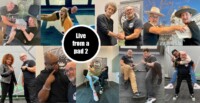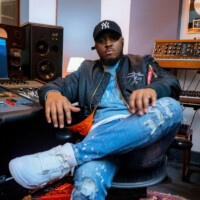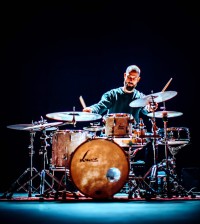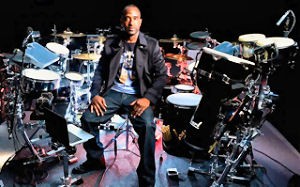 In don’t think Brian Frasier-Moore needs any introduction anymore. His CV, with names like Justin Timberlake, Christina Aguilera, Janet Jackson, The Whitehead Brothers, Aaliyah, Usher, Jill Scott and Pattie LaBelle (to name a few), absolutely speaks for itself.
In don’t think Brian Frasier-Moore needs any introduction anymore. His CV, with names like Justin Timberlake, Christina Aguilera, Janet Jackson, The Whitehead Brothers, Aaliyah, Usher, Jill Scott and Pattie LaBelle (to name a few), absolutely speaks for itself.
I had the pleasure of catching Brian via Skype between his shows in New York.
Let’s very quickly talk about the beginning. I know you grew up playing in church, but when and how did you make the transition into ‘I have to do this for a living’?
That was actually a bit crazy. The transition came around my mother and father telling me I had to do something to get out of the house. It started with a lot of local connections and musical directors around town. Staying at clubs and in studios, and just really being in the right place.
The challenge was going from ‘I’m a drummer, I can play anything all over the place’ to really honing in on your skill and giving the gig what it needs. Not to be disrespectful to someone else’s music or anything like that.
That was kind of the tough part because you know, as musicians we just wanna come out and go ‘Rawr! Rawr! look at me!!’ – but sometimes it calls for something not so dramatic or something a little more educated as far as music is concerned. That was a big transition for me.
Playing shows was still a lot of fun, the endorsements got better and as far as publicity goes I learned how to market it. But it is still a constant challenge of being that spirit of someone else’s music
Talking about that, I remember reading that you once said some people coming from a gospel background struggle playing pop because they tend to overplay.
Yes, and I understand that. Coming from that church world where it’s the exact opposite. You got to come in with everything you know – and more! But I know church guys can do it because from the stuff they play, you can play anything. It’s just a different mindset and whether that’s for you or not.
You’re currently out on the road with Madonna for her ‘Rebel Heart’ tour. Tell me a bit about that.
Ah yes, the tour is going amazing! We had three months of rehearsals before we even started the shows. I remember making a post at some point saying this was our 100th day of rehearsals.
Now we just finished two nights at Madison Square Garden, tomorrow we’re moving on to Barclay’s Center, still here in New York. This gig is really fun. It’s very different.
I was out with Justin Timberlake before which is more of an acoustic set. This Madonna gig is far more electronics. I’m using 18 external triggers, triggering snare drums and kick drums – it’s just that type of gig, it’s what the boss wants. That becomes a challenge as well but all in all it’s great to up there with an icon like her.
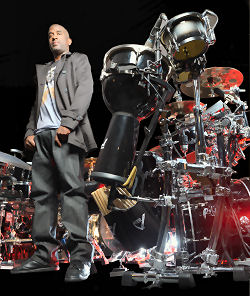 You did her last three tours. How did the Madonna gig develop over these years?
You did her last three tours. How did the Madonna gig develop over these years?
The drummer before me was my good friend Steve Sidelnyk, he’s an amazing guy, I love that dude! He was playing an all electric kit, so when I came in first, it was a bit of a challenge at first to get her to accept acoustic drums. That’s when the whole triggering came in as well. Of course as we’re moving further down the line with Madonna the records change too. Back then that album was produced by Kanye West, Justin Timberlake, Pharrell – the music was different then. But now when you have songs produced by Diplo and other amazing Dj’s and producers, your style as a drummer has to change. And this is what sometimes can be the tough transition. You need to go and listen to Portishead and Diplo. If you don’t listen to all of their stuff you’re gonna be out of the mix of what’s expected.
Are you recreating the album drum parts note-for-note or are you putting a bit of your own thing on it?
You know, it’s very tricky with Madonna and I respect it. Some artists live with the records for years, so it’s a fine line depending on the artist. On this gig I actually take the original samples from the record and I distribute them throughout my kit. Sometimes it may call for a 10 inch snare to be triggered with a clap because it fits, trigger kick drums I put in there. It always depends on the feel of the song if I do something extra, if I can get away with it. You have to be very clever with that.
You already mentioned you went out with Justin Timberlake for his ‘20/20 Experience’ tour. How did that compare to the Madonna gig?
On an artist level they are both brilliant, know what they want and have an amazing sound. There is a difference sometimes – and no offence to anyone – a woman to a man. In that sense with Justin it was like hanging with the boys: “Hang with the fellas, let’s go do this and that!” With Madonna, seeing as she’s a woman it’s just a bit different.
Band-wise seeing as the Justin gig was a very live / acoustic situation, so freedom was a little more accepted. It made it fun! I played with some good friends of mine to great crowds.
Madonna is more a producer/drummer type of gig.You have to make sure that your execution on the things that are there are on point.
You’ve also worked with Christina Aguilera for 10 years. How did that come about in the first place?
Christina Aguilera was my first audition. I went to Los Angeles for it, had nowhere to stay, that whole type of story – and I got the gig. I actually auditioned in front of Ron Fair who pretty much discovered Christina. That relationship began to grow. I learned a lot about electronics, touring, endorsements, just everything. Me and Christina were really tight and became friends. Once again there’s that woman thing: “This is my drummer!!” [laughs].
It was a great thing and it lasted a very long time.
You said that’s where you learned about electronics. Was that not something you were into before?
To be quite honest I’ve played with The Whitehead brothers, Usher, Aaliyah and all of that stuff was before triggers and electronics came into play. Then for Christina Aguilera and the pop world the expectation of me was higher.
When I first played with Janet Jackson I was so hyper. I auditioned, got the gig and immediately called my mum: “Mum, I’m playing for Janet Jackson! Can you believe it?!” [laughs]
I remember going into rehearsal and Jimmy Jam came over. I was completely floored! He said: “Glad to have you here. Here’s a CD for you with all the drum samples.”
I just went: “Thank you.” – but in my mind I had no knowledge of how it’s done or what do do with it. So that was kind of a crash course.
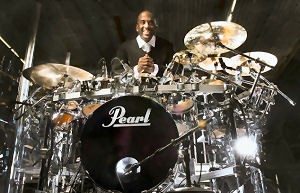 I once read in an interview you did that one of your keys to success is your attention to detail. Can you explain that a bit?
I once read in an interview you did that one of your keys to success is your attention to detail. Can you explain that a bit?
For instance, if I play for an artist like Timbaland. At that particular time when Timbaland was out, this was the new sound. A lot of times as a drummer we all know if we here something that has that kind of feeling, we sometimes just take for granted that’s what it does after we stop listening. So a lot of times I would do that and a lot of musical directors and artists would say “Hey, that’s really not the beat!”. This input and criticism that I would get kind of honed me to pay attention to details. To play the beat but give my little nuances inside of that. Not to make the beat one big nuance of what it was supposed to be.
That keeps me working and it’s what the people I work with tell me they appreciate most.
Does that have to do with the artist feeling you respect their music too?
Absolutely. I mean, can you imagine if you’re an artist and spend all that time on a project and then someone comes in and just goes “bllrruaahrhgghg!!”. You’d go: Wow, he has no respect.
What’s your process when you sit down to learn huge shows like this?
Most important tool is my composition book. I always have that on me to write out beats, hits and all that stuff. Before I even get into rehearsals I’ll chart out all the songs and know where everything is going: the arrangement, the accents are on bar 7 beat 2 and so on… Then once I get into rehearsal that’s when I start to chart out again knowing what the actual arrangements are gonna be. So I’m writing everything down and when we run through things I can look down and know what’s happening.
This is a process that helps me. Other than that, my brain is gonna be fried. I would spend all my concentration on trying to remember the parts than actually playing them.
How do you stay switched on when you’re in a rehearsal room for three months playing the same stuff? Doesn’t that just take it out of you before you even start the tour?
It does. I mean, it can. For a person who is a perfectionist this can work out well. You can take your time and really go into depth. But yeah, three months is a long time!
I saw the ‘standing up’ electronic kit you used at the Grammys and BRITS this year. How did that come about?
Yes. Actually, we’ve been doing different versions of stand up kits for many years. It was designed by my former tech Chris Achzet. We were just throwing ideas back and forth but we have a 15 year relationship so he kind of knew what I was looking for. Chris also has this company called Los Angeles Drum Services and specialises in cymbal toppers, custom racks, logos on drums and cymbals – it’s like a toy store! We were working together around this time but then he went back home to attend to his business.
Now I have a tech I’ve been working with before for about five years: James JR Newkirk. He has designed this new rack, got the bars powder coated – it’s pretty much custom everything. That’s how I like to work.
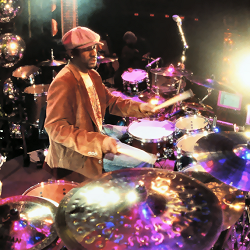 We had a little glance at you putting your touring kit together in a video shown in the Mike Dolbear Webshow.
We had a little glance at you putting your touring kit together in a video shown in the Mike Dolbear Webshow.
Actually, the thing about the Gibraltar video is that we did it before we got to rehearsals. So we have a whole story to tell about this kit. From the time it started in my backyard, the time we got to rehearsals and got everything set up, to the time that Madonna came in and said she wanted everything black – including all the bars, all the lugs, all the springs and everything. So there are different phases to this kit but that one at home – yeah, we had a great time. We didn’t know it was gonna change that much.
You always had a thing for big flashy kits and racks. Is that part of the show?
I blame Ron Fair! [who discovered Christina Aguilera]
When I first got onto a pop gig I had two rack toms and one floor tom on stands. After I got the gig Ron came in and went: “What is this?!”. I said: “That’s my drum set”. He went: “No, this is pop. This is the pop show. People come to a concert and they wanna see big drums! Don’t ever forget that.”
There are worst things than being told to get more drums..
Exactly! More, more… [laughs]
At what stage in preparations for a tour like this do you put your gear together?
The tough part is not knowing what you’re gonna need when you go into rehearsals.
If you work with artists who are somewhat crazy, like Madonna, then you never know what to do. What I do is from the time I hear she’s going on the road I already start thinking how we can make this special. “I want ‘Rebel Heart’ on all the drums – alright, let’s put that in the making. What colour do you think they want? Game of Thrones? I don’t know what colour Game of Thrones is. Right, let’s make the kit piano black, out the chrome stencils on it and get the Gibraltar guys drawing out some rack ideas.” All of this before we even get to rehearsal.
One thing about these rehearsals man: rehearsals are not for rehearsals. Rehearsal is to come in and be ready to be perfect. It’s a tough world.
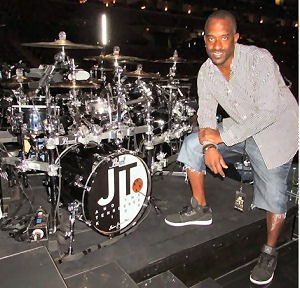 So I’m guessing your set up still changes a lot during the rehearsal period?
So I’m guessing your set up still changes a lot during the rehearsal period?
Yeah. Sometimes it’s like: “Let’s play this song. Play it on acoustic drums with a trigger. Ah no, you know what, there is too much ambience. Play it on the pads but we want you to switch to the acoustic drums for eight bars.” Then you’re like: Ok, I can’t turn to the second kit and then switch back in time, so now I have to incorporate electric pieces in my first set. It could be anything.
One day Madonna said “I want a Djembe.” I KNEW she would gonna do this, so I had ordered a Djembe and some Bongos and just had it in the back.
So when she went “Man don’t you have like a Djembe or something?”. I just went: “Hold on, I’ll be right back.” and I ran to the back, came out with a Djembe and everybody was like: “How in the world did you know…?!”.
If you work with this woman you just got to be ready for any- and everything!
You mentioned you use 18 triggers on this gig. How important do you think electronics are nowadays?
Yes. I’m triggering kick, two snares and have loads of trigger pads. I might have three to the left, two here, two Drumkats on each side that feed into the electronic drum kit on the right side. I just wanna be unlimited to be able to stand up when I wanna play, play it over here, over there, behind me – just to make it fun.
And that’s the world we’re going to. There was a song out a while ago by Ciara called ‘Goodies’. It’s a 808 kick drum and a dirty clap and I heard a drummer play it on acoustic kick and 14” snare. That’s when I knew times are gonna change. It doesn’t even have the same effect. I think nowadays people like Kanye West, Madonna, Taylor Swift and all these people who have their signature sound, it’s gonna be expected for drummers to trigger pretty soon.
With a CV like yours, do you still have something like a ‘dream gig’?
YES!! Sting. That’s my dream.
I first heard about Sting because of Vinnie and then I had to backtrack and learned about The Police and Stewart Copeland and everything. So I kind of came in because of Vinnie, he’s one of the biggest influences in my whole drumming life. Naturally so I gravitated to that music. I love Sting’s writing; I love the appreciation of the band; I love the fact you just come out on stage with your fellas and you play and you just leave. No dancers, no click tracks… you see what I mean? Something like that – a Sting or a Lenny Kravitz type of gig would be my thing.
You’re pretty much always on tour. The JT tour was 15 months, Madonna now almost 8 months. How do you cope with being away from wife and kids for that long?
It’s so hard man! My children are pretty much grown at this point (16-22), they don’t have time for Dad these days – but they love me and I love them.
My wife is a school teacher. She always travels around to see me when she has a chance. For example she was with me for the whole time when I was rehearsing with Madonna for three months.
Sneaking home for days at a time to make her feel I’m there with her. That’s very important to me.
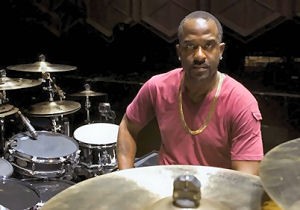 With touring and family taken care off, do you find time to work on other projects?
With touring and family taken care off, do you find time to work on other projects?
I have a consultation service that I offer to anyone who has any questions about the music business. The outcome is amazing. Sometimes people call and say “I was in the studio today and the engineer told me my drums sound terrible”. And I go: Alright, let’s investigate, find some answers. What kind of heads do you use? Maybe try these ones. Where is your sweet spot? Just an encouraging word to a musician sometimes can do a lot remedy.
So I do that a lot which leads me into doing seminars and clinics when I’m travelling around.
I just did a taping for a documentary for the BBC Network called ‘Music Industry’ and I’m involved in clothing. I just try to be everywhere I can. I’m getting old man, my bones are not moving the same anymore. [laughs]
Lastly, anything else you’d like to share?
Man, I’d just like to say that I would like to encourage everyone to chase your dreams. You can really do it. Just be hard working and always pushing the next level of how you present yourself. It’s gonna work, stay encouraged!
Perfect note to end on! Thank you so much for your time Brian!
Interview Tobias Miorin
October 2015

